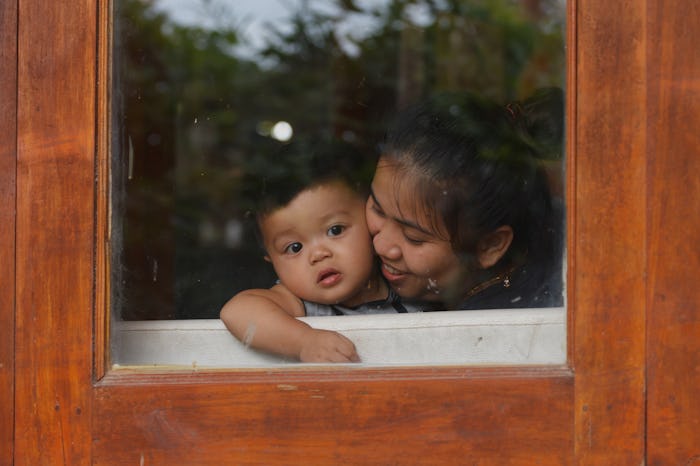For a recent school assignment, my 5-year-old was asked to draw a picture of life at home during the pandemic. She drew a family picnic. I’m holding my daughter, and we’re all smiling. I laughed when I saw it, because life is hardly a picnic right now. But it illustrates the way I have managed to hold the world up for my kids. It is a product of my emotional labor.
Looking out through the windows of a house we cannot leave at life before the pandemic, the mental load so rightly protested then seems like merely a warmup. In a way, you could not have manufactured a crisis more onerous for parents: While the pandemic has abruptly and catastrophically halted much of everyday life — school, daycare, parks, playgrounds, the ability to send the kids to Grandma's on a Friday night — the work of managing a household and children remains fixed and necessary. So on top of doing everything that’s normally exhausting us (and, as study after study has shown, is burning us out completely) COVID-19 has unceremoniously dumped considerably more on our “to do” lists while sending our kids' schedules, relationships, and emotions into upheaval.
He is a little more weepy and veers between being clingy and wanting to be in my lap all the time to being defiant and pushing the boundaries.
And there is no escape, no matter where you go. Rachel Kahan, a mother of two, moved her family temporarily from Brooklyn to a family house in New England to reduce contact. Uprooting her 5- and 2-year-old meant remaining in quarantine for two weeks, without stepping foot off the property. (Her sister-in-law was able to get food to stock the house.) “The 5-year-old, who is very social, really misses his preschool class and is more discombobulated by the loss of routine," says Kahan. "He is a little more weepy and veers between being clingy and wanting to be in my lap all the time to being defiant and pushing the boundaries.”
The emotional toll of this pandemic is hard for everyone, whether or not they have children. But mothers have an added challenge: feeling just as insecure and worried as everyone else while striving to make sure that her children feel just as safe and supported as they always do.
Alexandra Sacks, M.D., reproductive psychiatrist and host of the Motherhood Sessions podcast, says that helping children navigate their emotional world is not a new challenge. "Verbalizing how the world works and how to understand their inner emotional life and their outer physical experience in the world becomes a daily part of parenthood," she says. And right now, we're all facing "new emotions and a new conceptual frame of living," while trying to explain to our kids something that "we ourselves are also learning how to understand."
Erin Ward, a mother of two and small business owner in Long Island, has dealt with much of this pandemic single-handedly. Her current partner has often been with his children from a previous marriage. Her ex-husband is a mortician. “He’s dealing with people who are dying from this,” Ward says. “He’s going into hospitals and nursing homes." He could see their sons, she says, but "we don’t want to risk it. That’s a whole emotional thing for [the boys].”
In addition to their disruption in school routine and separation from their father, Ward’s sons have been anxious about the pandemic itself. “They hear things we don’t know that they hear,” she says. “And it’s so hard trying to help them with their emotions. [My youngest] was coughing one night and was sobbing until he was almost threw up that he was going to die from the coronavirus. I told him ‘You’re not going to die.’" But parents are grappling themselves with a lack of control. "I couldn’t tell him he’d be fine because I didn’t know,” says Ward.
Ward says she feels numb. “I would only equate this level of exhaustion to those first couple of weeks of childhood. It’s like that newborn world where you’re like ‘I wanted this but I’m dying.’”
And, while the newborn phase has a finish line at around 12 weeks, we don’t know when this pandemic will end.
By my calculations, I’ve added approximately five hours of work to my daily schedule overseeing schoolwork, making extra meals, cleaning extra messes, and grinding through my regular job in fits and starts. Yet that pales in comparison to the emotional labor of assuring my kids that everything is fine. I believe that’s true — probably because I have to — but believing takes effort. Parents are not all-powerful against a virus, and we are working through things alongside our children.
"As you articulate to a child something like how to calm down, how to feel safe, how to take care of yourself, you may have the first opportunity to explain it to yourself," Sacks says. Parenting offers a "beautiful opportunity in this moment to try to make sense of what's happening and try to put it into words."
I give a lot to my children — energy, attention, affection, and on — you see it reflected back in my daughter's picture. That in itself is a lesson, says Sacks. "We as adults don't often parent ourselves as gently and thoughtfully as we'd parent a child."
We're good parents, and we deserve emotional care right now too.
